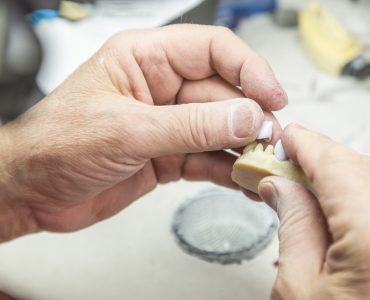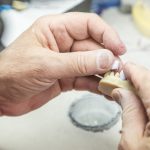Regardless of the efficiency of your oral hygiene routine, at some point in your life, you may need to replace or repair one or more of your teeth. While dentures and dental bridges remain popular choices, today’s ever-advancing technology allows for a variety of options when confronting the task of tooth replacement. More and more, people are turning to dental implants.
It is estimated that 35 million Americans are missing all of their teeth in either one of both of their jaws, and millions more are missing one or two teeth.
While implants are a functional and desirable choice, choosing a type of implant and preparing for the implant procedure is a complicated process. The breakdown of costs for dental implants is the logical place to start when considering tooth replacement.
We’ve put together a comprehensive and easy to read guide, in the hope that this helps with any queries you may have regarding dental implants.
How it works
Dental implants are an investment. Trying to source budget options and cheap fixes may not end well. It is essential to consider the improved well-being and other advantages that are impossible to set a monetary value on. That said, it is vital that you fully comprehend what is involved in the procedure(s) at hand as well as the costs thereof.
If you’re lucky, your chosen implant specialist will offer you a free initial consultation. This is a time to ask all of the questions you may have.
It can be helpful to compile a list of these questions before you go to your first appointment.
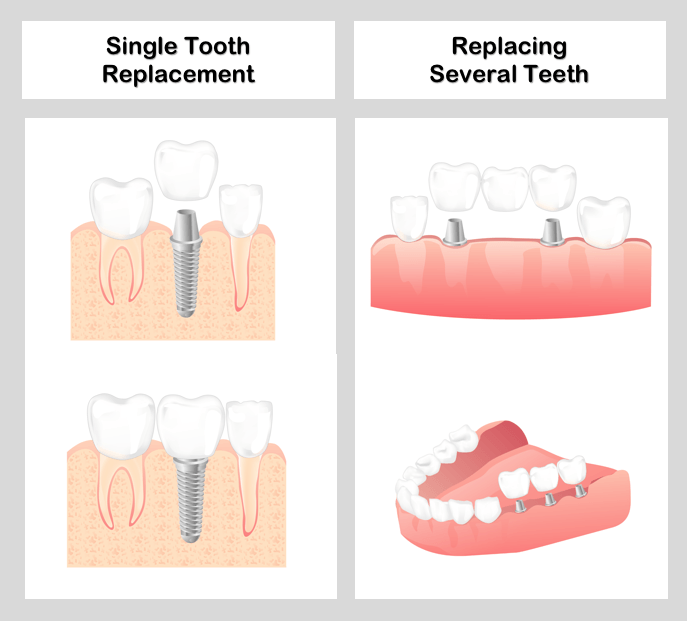
During this first meeting, you will have a chance to express your needs and expectations. The attending specialist will also have questions for you as she/he considers your unique circumstances and whether or not you are suitable for various procedures.
From the information gleaned at the consultation, the dental practice will assess your suitability and be able to present a financial breakdown for the recommended treatment plan. Different dental surgeries will itemize costs differently.
Sometimes, a multi-step procedure may include the participation of more than one practice, and this may also affect the costs. If you have any questions or concerns, do not hesitate to bring them up with your dental implant provider.
Most practices will be more than happy to give full disclosure of the cost breakdown for your procedure. If you feel this is not the case, you might do well to consider an alternative practice. It may be ideal to seek quotations from several dental surgeries to source the most suitable options for your own unique needs.

TIP!
Beware of saving schemes that lure in customers with discount prices. These schemes often mask costly elements to make a very expensive process seem cheap up front
The process
It’s important to understand, at the outset, what you are actually paying for when you purchase an implant. Each implant, for instance, is composed of three parts: The crown, the abutment, and the implant.
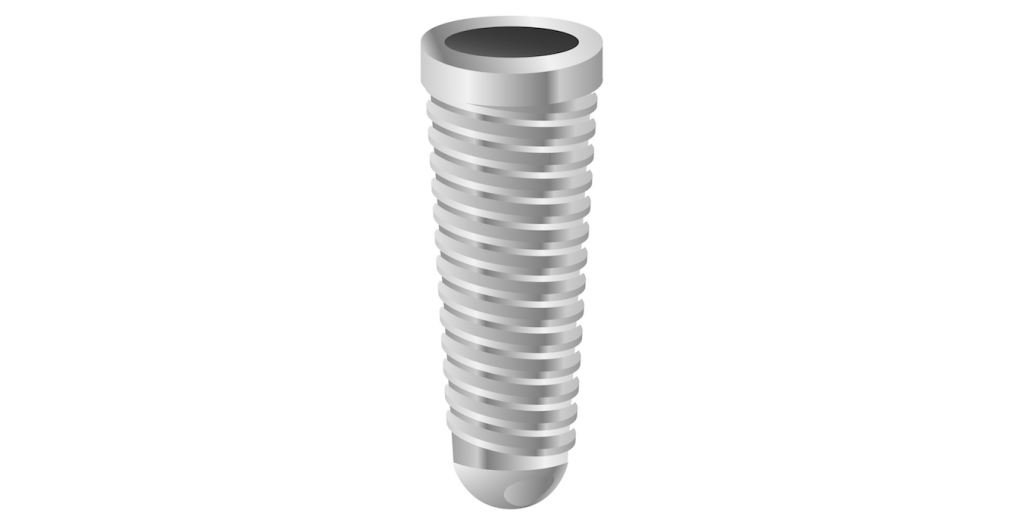
The Fixture
This is the body of the implant, and will be inserted into the gum where the tooth is missing.
The Abutment
Screwed into the fixture, this is the connected between the implant and the crown.
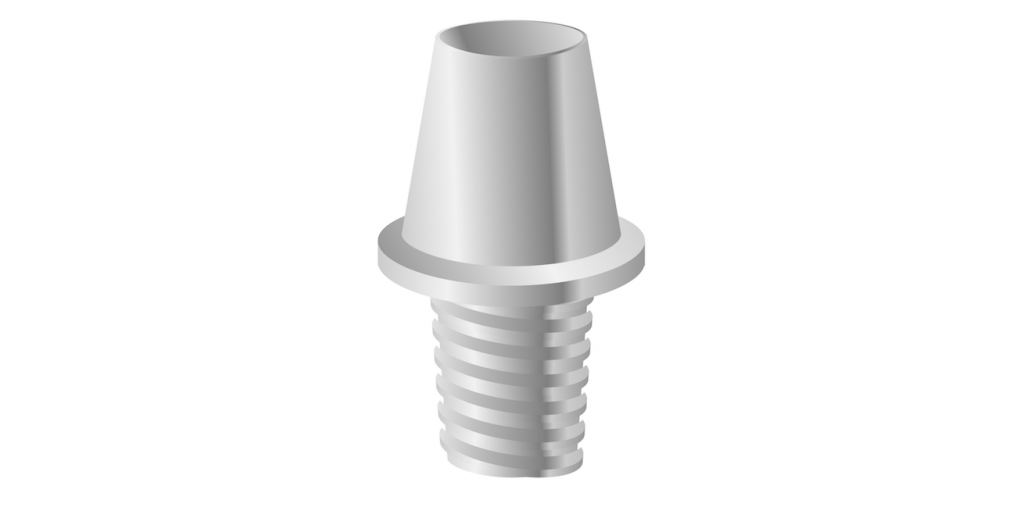
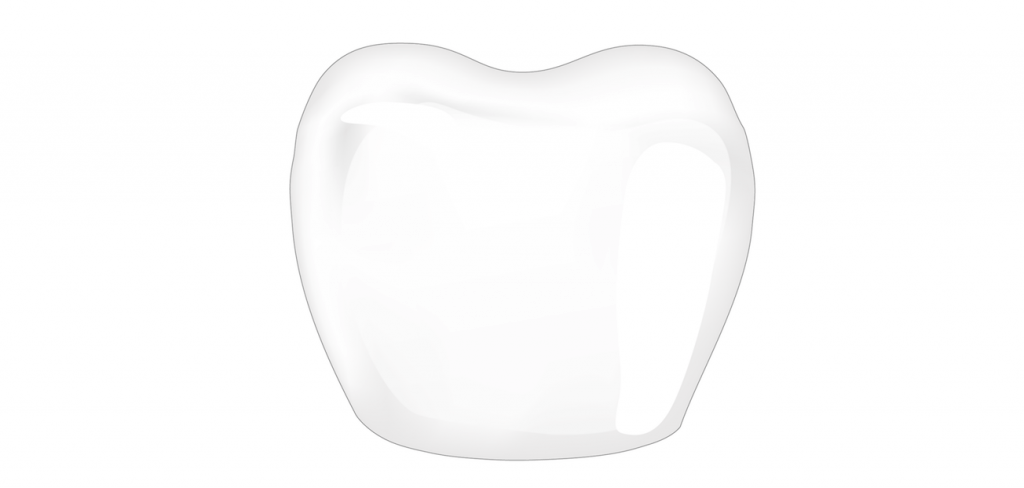
The Crown
Once healed, the permanent crown will be fitted, completing the process.
All three together
These three components combined create the full implant. The entire process is completed over 6 – 12 months, with the finished implant both looking and functioning like a normal tooth.
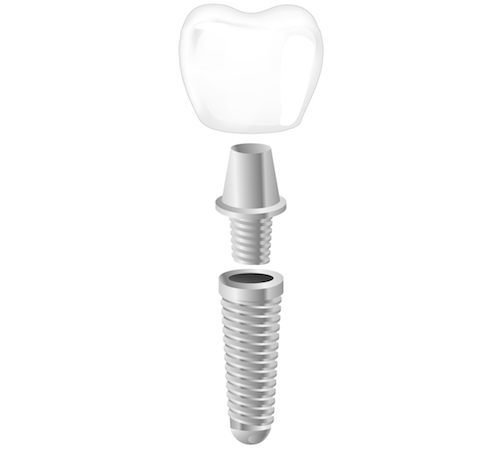
Costs
- Pricing for implants includes the sum of the cost of those three parts as well as any necessary procedures
- The price for one implant may range between around $1500 to upwards of $6700
- May depend upon a variety of factors including the placement of the tooth
- Implants in the front of the jaw usually cost more than those in the back as the front teeth can be a challenge to restore due to spatial limitations
- The abutments for front teeth often require customization and are more challenging to work with than the standard abutments usually used for back teeth.
If you had to have all your teeth replaced with individual implants, therefore, it would be prohibitively expensive. Thankfully, there are methods whereby multiple teeth may be replaced using a dental bridge for support, which can bring the cost down considerably.
Nonetheless, dental implants are a weighty investment. To completely replace a full set of teeth, it could cost you between $36,000 and $90,000 (based on two dental bridges each bearing six implants).
Single tooth implant costs
| TREATMENT | LOW | AVERAGE | UPPER END |
| Implant element | $900 | $2,500 | $3,200 |
| Abutment and crown | $600 | $1,500 | $3,500 |
| TOTAL | $1,500 | $4,000 | $6,700 |
Multi teeth implant costs
| TREATMENT | LOW | AVERAGE | UPPER END |
| 3 tooth bridge with 2 implants | $2,800 | $6,000 | $12,000 |
| 4 tooth bridge with 2 implants | $4,000 | $8,000 | $15,000 |
| Dental bridge with 4 implants | $8,000 | $18,000 | $25,000 |
| Dental bridge with 6 implants ( a full arch) | $18,000 | $30,000 | $45,000 |
| Full mouth (2 full arches) | $36,000 | $60,000 | $90,000 |
Factors that will affect pricing
The range of pricing, as discussed above, may reflect a number of factors. For example, bridges for the upper jaw require a more extensive procedure thanks to the more fragile nature of the upper jaw bone in comparison to its lower counterpart.
Choice of material
The material used for your dental implant will vary from clinic to clinic. You may also have the option to choose your implantation elements according to your preference and needs.
- For each of the three elements, there are a variety of choices
- Your choice will be affected by your situation, the size and condition of your jawbone, the placement of the tooth in question, etc.
- The titanium screw element comes in a variety of sizes and textures (more or less porous to best match with your unique bone composition and aid in successful, speedy implant assimilation)
As for the crown, there are many choices as far as materials from the most affordable (resin) to higher quality options such as metallic porcelain or ceramic. A single crown can range between $500 and $3,000.
Position
As previously mentioned, the position of the tooth or teeth to be replaced can also have an impact on cost. The molars and other teeth towards the back of the mouth are cheaper to replace. Implants in the front of the mouth are usually more expensive for a few reasons.
- Dental surgeons take esthetic issues into account when pricing implants for teeth that show in the patients’ smile
- As well, the abutment elements (connecting the implant to the crown) for front teeth are more expensive than their counterparts
The spatial issues of implantation in the front of the mouth, where there is simply less space to maneuver, necessitates more work and can drive the overall price up.
Skill and experience level
The clinical experience and skill level of your practitioner will have an impact on the price you pay.
- If you are looking to save money, you might find a recently graduated dental surgeon starting a new practice
- They may be looking to expand their portfolio of work, as it were, and have pricing to reflect their newness
- Established dental surgeons with lots of implant surgery under their belts, accolades and success stories usually charge premium prices for their proven expertise
Of course, if your procedure(s) require professional aid outside of your dental surgeon, the total costs for labor will rise exponentially.
Location
Prices can vary widely by location. In urban or popular centers, rates will be higher than in outlying towns and rural areas.
This could be as much as double the price of your dental work if you choose a dental surgeon in Los Angeles, for instance, as opposed to Cincinnati.
Hidden costs
Another thing to consider is the ‘hidden’ costs of dental implants. By now, you are familiar with the basic range of prices for replacing teeth via dental implant. It is important to remember to take into account all of the clinical work leading up to your dental surgery.
Imaging test prices
| TREATMENT | LOWER END | AVERAGE | UPPER END |
| Dental X-ray | $25 | $150 | $250 |
| Dental CT scan | $250 | $700 | $1,000 |
- An excellent dental surgeon will strive to avoid mishaps such as nerve damage or poorly integrated implants by becoming solidly familiar with your unique dental history and the current state of your teeth, gums, and jaw
- This sort of preparation requires imaging procedures such as X-rays and scans
- The three common types of image used are ordinary, bitewing, and panoramic
An X-ray may run between $15 (for an ordinary X-ray) up to $200 (for a full-scale panoramic image). The more comprehensive CT (computerized tomography) scan may run between $250-$1000.
Condition of the jaw
Your dental bill may be further impacted by the individual nature and condition of your jaw. Over time, and with tooth loss, bone can deteriorate and become more porous.
- Your jawbone may not be able to support dental implants depending on your individual condition
- In situations where the jaw is not healthy enough to support dental implant surgery, you may need to have an additional procedure called bone grafting
There are three basic types of bone grafting that may be available to you, read on to find out more below.
The different types of grafting
Socket grafting
Socket grafting is a simple bone augmentation that allows the clinician to increase your bone density at potential implantation sites. This process uses bone material from other parts of your body or, in some cases, from a donor or from a synthetic source. The supplemental bone material is grafted where necessary allowing for increased bone mass and fostering a more viable implantation site.
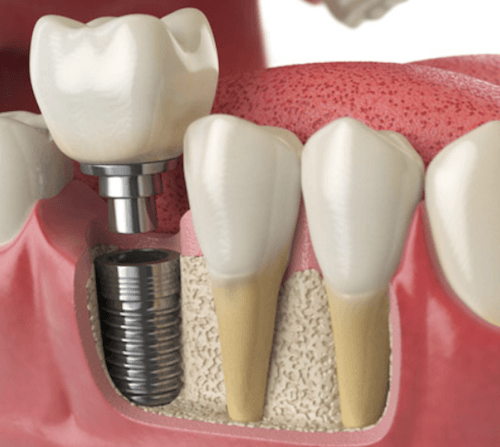
Block grafting
Block grafting is a rarer procedure. It is particularly employed where patients have, unfortunately, lost a great deal of bone and/or bone quality. For a block graft, a piece of bone is removed from an alternative location in the patient’s body and affixed where necessary using titanium screws.
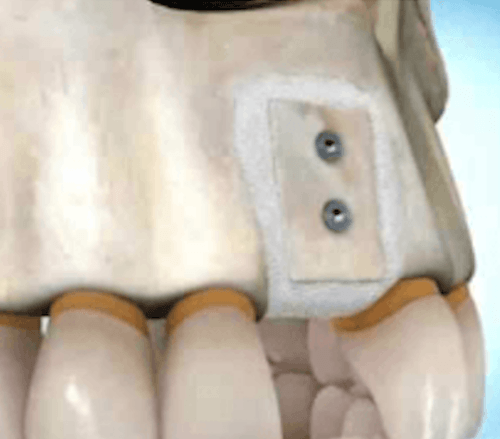
Sinus grafting
Sinus grafting is required for cases where the maxillary sinuses (sinus cavities residing above the upper back teeth) must be shifted in order to allow for dental implantation. When teeth are lost in the upper back of the mouth, the sinuses can shift and interfere with the jaw bone area. In order to amend this, a bone graft is used to prop the sinuses back into their original position and make space in the jaw to add implants.
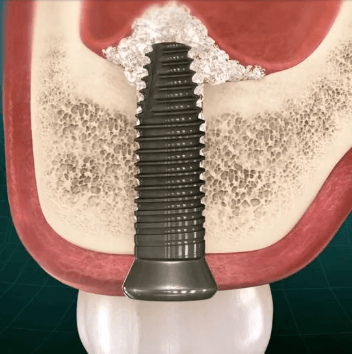
Bone grafting prices
| TREATMENT | LOWER END | AVERAGE | UPPER END |
| Simple bone graft | $200 | $600 | $1,300 |
| Complex bone graft | $1,800 | $2,000 | $3,300 |
All three bone grafting options bring with them a fairly hefty healing time so if you require such attention, bear in mind it can take three months to a year after a bone graft before you are ready to continue on with dental implant surgery.
As far as pricing is concerned, sinus and block grafting are considered complex procedures and may take longer and cost more.
Socket grafting in a small area, particularly where using donor or synthetic bone, may be considered a simple graft procedure. Any grafting done with your own body’s bone will usually be considered complex.

TIP!
Have only a soft food diet for the first few weeks, and avoid using a straw as this can cause increased bleeding, or the blood clot to dislodge
Extraction
If the tooth to be replaced has not yet been lost, you will require an extraction, and this can lead to additional costs. Removing the tooth from its socket can be (and is usually) a fairly simple operation.
In a simple extraction where the tooth or partial tooth is fully visible in the mouth, local anesthesia is used, and the dental surgeon will use forceps to manipulate and remove the tooth from the socket.
A tool called a luxator or elevator may be employed to enlarge the socket area and ease extraction. This type of non-surgical extraction may cost in the range of $75 – $300 dependent upon any emergency considerations, where the tooth is located, ease of the procedure, and the dentist.
Surgical extraction
In certain cases, a surgical extraction is called for. For instance, if the tooth is broken at the gum-line or too deeply embedded in the gum and jaw. In these cases, a dental surgeon may employ a number of techniques in order to remove the tooth in question.
- A more complex extraction may require a general anesthetic as opposed to a local
- Gums may be cut away, and bone may be removed, depending upon the individual situation, in order to facilitate extraction
- In some cases, a difficult tooth must be cut into pieces in order to be extracted
- Stitches and dressing may be required to complete a difficult extraction
Because of all these mitigating factors, surgical extractions may range from $150 to $650 or even more depending on the complexity of the extraction.
Your insurance may cover a significant portion of your extraction if it is deemed medically necessary rather than primarily esthetic. As with extraction, your insurance may cover a portion of your dental implant costs. However, this is rare.
Unfortunately, in many plans, dental implants are considered a cosmetic procedure and therefore unqualified for medical insurance coverage. You will have to research your own insurance plan in order to ascertain how much, if any, coverage is available.
In many cases, insurance will not cover dental implants themselves but will provide certain amounts for crowns or dentures that are part of the implantation process. It all comes down to perusing the fine print in order to discover how your insurance can work for you in the case of dental implant surgery.
Single tooth extraction prices
| TREATMENT | LOWER END | AVERAGE | UPPER END |
| Non-surgical tooth extraction | $75 | $200 | $300 |
| Surgical tooth extraction | $150 | $400 | $650 |
Prices around the world
If you like to travel, you might consider a course of medical tourism to get your dental implants attended to as prices vary widely from country to country. Of course, this option adds cost in terms of transportation, accommodation, etc. The practicality may also be a concern. Language barriers may make communication with your dental professional difficult or nigh impossible.
The distance travelled may make return visits to your dental surgeon for check-ups or amendments impossible or at least very impractical. Nonetheless, many who enjoy world travel do choose this option. Here is a list of some countries that offer dental implants and their prices.
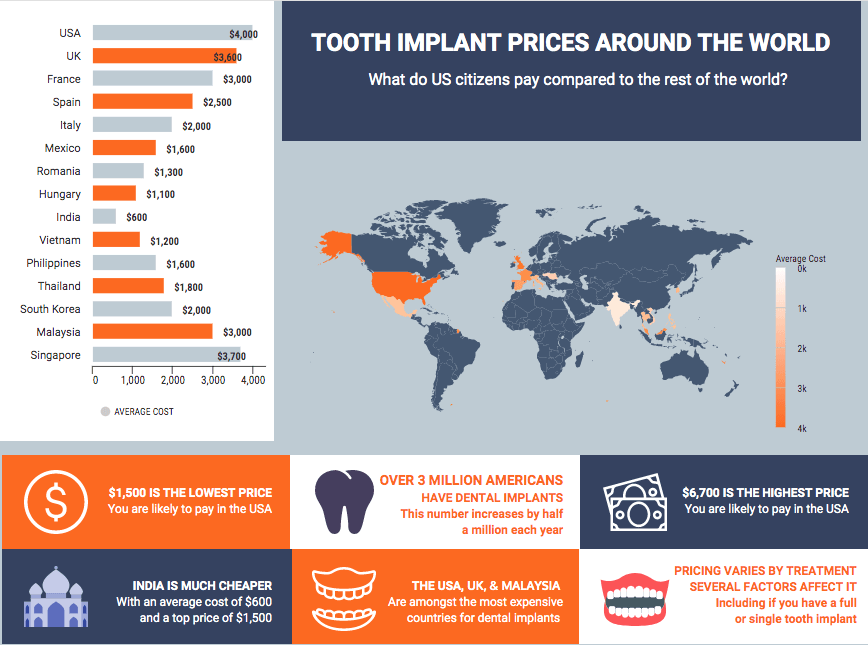
Dental implants, while the most popular of tooth replacement options in terms of effectiveness, are a weighty choice to make.
- Long lasting, durable and versatile, implants are versatile with a natural feel that can have a big impact on quality of life
- Implants can also prevent bone loss and allow normal eating habits to resume
- With no adhesives or special cleaning regimens, implants can take your mouth back to a place of ease and comfort
When you are considering dental implantation, though, do take into account its drawbacks as well. Implants are not a quick fix with an average 3-9-month treatment time. Any invasive surgery brings with it risks of complication and failure.
Even after you’ve made the decision to begin sourcing dental implants, once you enter the examination stage, your dental surgeon may find that you are not a good candidate for dental implantation.
Severe gum disease and an array of other medical history considerations (smoking, immunosuppression, certain medication intake, etc.) may prove prohibitive after a dental implant consultation. Then of course, there is the cost.
Tooth implant prices in Europe and America
| COUNTRY | LOW | AVERAGE | HIGH |
| USA | $1,500 | $4,000 | $6,700 |
| UK | $1,600 | $3,600 | $6,000 |
| France | $1,500 | $3,000 | $4,500 |
| Spain | $1,200 | $2,500 | $3,600 |
| Italy | $1,400 | $2,000 | $3,700 |
| Mexico | $900 | $1,600 | $3,000 |
| Romania | $800 | $1,300 | $2,600 |
| Hungary | $700 | $1,100 | $1,800 |
Tooth implant prices in Asia
| COUNTRY | LOW | AVERAGE | HIGH |
| India | $130 | $600 | $1,500 |
| Vietnam | $820 | $1,200 | $1,700 |
| Philippines | $230 | $1,600 | $2,300 |
| Thailand | $800 | $1,800 | $2,400 |
| South Korea | $900 | $2,000 | $3,200 |
| Malaysia | $900 | $3,000 | $9,000 |
| Singapore | $2,200 | $3,700 | $5,300 |
Summary
The true cost of dental implantation is an important consideration. It is an expensive proposition. When you are weighing your options, bear in mind all that we’ve discussed above and prioritize according to your needs.
Dental implantation is a complicated procedure that requires specialized skill sets and experience. Above and beyond all your considerations should be your choice of dental surgeon and trust thereof. Choose someone with experience and expertise and you’ll feel far more secure about plunking down thousands of dollars for the sake of your mouth.
Don’t forget to ask questions. Bring notes with you to the office so you remember to address any and all concerns or queries. Above all, take your time, compare prices and chose the dental professional that inspires the most confidence.
Citation links
https://www.statista.com/statistics/189977/cost-of-a-dental-implant-in-various-countries/
https://www.aaid-implant.org/dental-implants/what-are-dental-implants/
https://www.districtcosmeticdental.com/blog/why-over-3-million-americans-have-chosen-dental-implants-to-replace-missing-teeth






